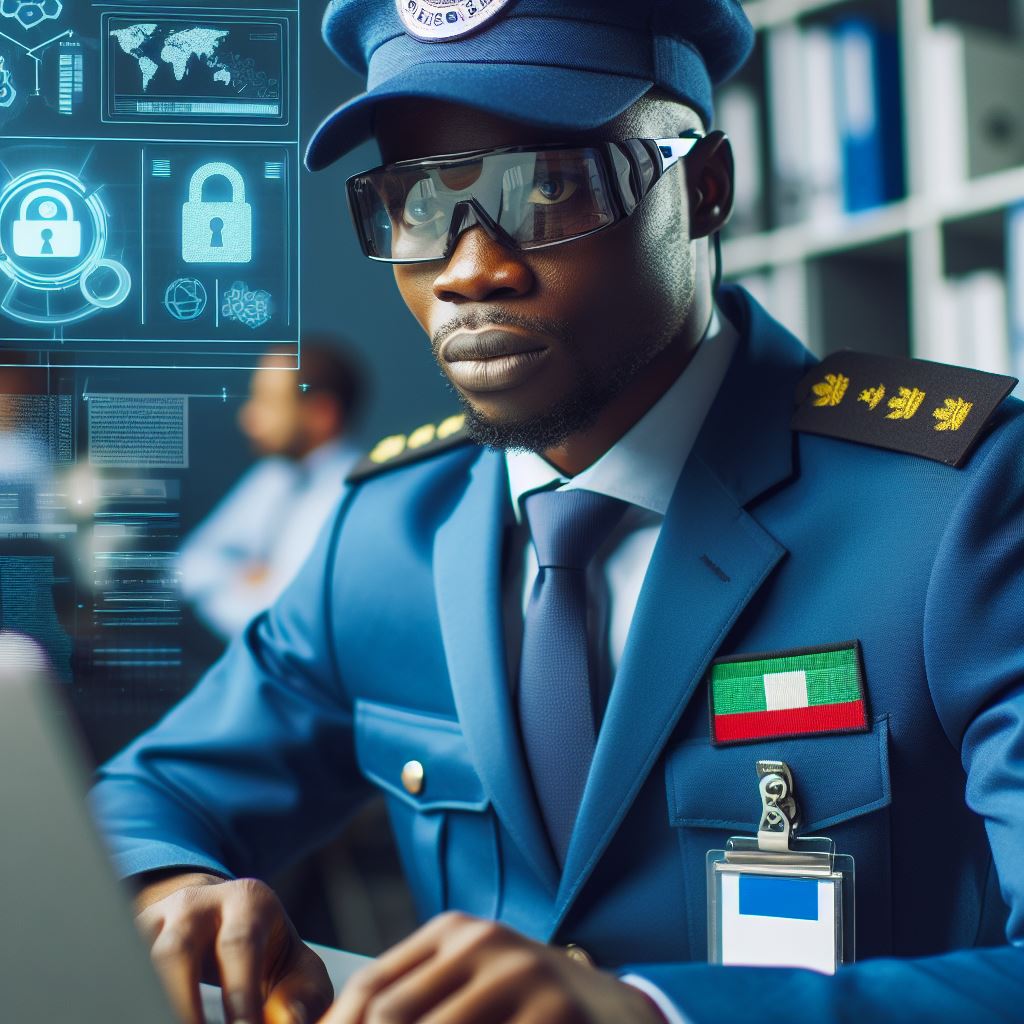Introduction
A sector that plays a crucial role in Nigeria is the security sector, responsible for safeguarding the nation’s safety and stability.
Graduates contribute significantly to this sector, bringing their knowledge, skills, and fresh perspectives.
This blog post will focus on sharing inspiring stories of graduates who have thrived in Nigeria’s security sector.
Thesis statement
Through showcasing these stories, we aim to highlight the potential and opportunities available for graduates in the security sector of Nigeria.
In Nigeria, the security sector encompasses various organizations and agencies responsible for maintaining law and order, protecting citizens, and combating threats.
It includes the Nigeria Police Force, the Department of State Services, the Nigerian Army, and other paramilitary organizations.
These entities work together to ensure the safety and security of the country and its people.
The presence of highly skilled and educated individuals is vital in the security sector.
Graduates bring a wealth of knowledge and fresh ideas to tackle complex security challenges.
They possess critical thinking abilities, technological expertise, and management skills that contribute to operational efficiency and effectiveness.
This blog post aims to shed light on the success stories of graduates who have ventured into the security sector in Nigeria.
By showcasing their achievements, we hope to inspire and encourage more graduates to consider a career in this sector.
Each story will demonstrate how these individuals have made a significant impact, overcome challenges, and thrived professionally.
Through these stories, we can challenge the perception that the security sector is limited in terms of career opportunities for graduates.
Instead, we seek to emphasize the diverse range of roles and positions available, showcasing the rewarding and fulfilling nature of working in Nigeria’s security sector.
In the upcoming sections, we will dive into these inspiring graduate stories, highlighting their accomplishments, dedication, and the positive impact they have made within the Nigerian security sector. Stay tuned for these remarkable tales of success!
Overview of the Security Sector in Nigeria
Security challenges faced by the country
In Nigeria, security challenges are pervasive, impacting all aspects of society.
The country faces multiple threats, including terrorism, insurgency, communal conflicts, and violent crimes.
These challenges necessitate a robust security sector to ensure the safety and well-being of citizens.
Government agencies responsible for security
The Nigerian security landscape is predominantly overseen by various government agencies.
The Nigerian Police Force is at the forefront, responsible for maintaining law and order.
They combat crime and respond to emergencies, working closely with other security agencies like the Department of State Services and the Nigerian Security and Civil Defence Corps.
Additionally, the Nigerian Armed Forces, comprising the Army, Navy, and Air Force, are crucial in defending the country against external threats.
Role of the private security sector
However, government agencies alone cannot handle the enormity of Nigeria’s security challenges.
The private security sector plays a complementary role in ensuring the country’s safety.
Private security companies provide additional security services to individuals, businesses, and organizations.
These services include surveillance, guard services, and asset protection.
By collaborating with government agencies, the private security sector enhances overall security measures.
Importance of a skilled workforce in addressing security issues
The significance of a skilled workforce in addressing Nigeria’s security issues cannot be overstated.
Well-trained security personnel are essential in effectively responding to emergencies and protecting lives and property.
They are equipped to handle various security threats and challenges, from armed robberies to insurgency.
Skilled professionals also play a vital role in intelligence gathering, aiding in the prevention and detection of criminal activities.
Continued training and professional development programs are necessary to keep security personnel abreast of evolving threats and enhance their capabilities.
In fact, Nigeria’s security sector faces profound challenges due to terrorism, insurgency, communal conflicts, and violent crimes.
While government agencies bear the primary responsibility for security, the private security sector complements their efforts.
A skilled workforce is crucial for successfully addressing these challenges and safeguarding the nation.
By investing in training and professional development, Nigeria can foster a competent security workforce capable of thriving in the face of evolving security threats.
Read: Security Tech Internships: Opportunities in Nigeria
Importance of Education and Skills in the Security Sector
Impact of education on enhancing security operations
- Education plays a crucial role in improving the effectiveness of security operations.
- Well-educated security personnel have a deeper understanding of threats and how to address them.
- Higher education equips individuals with essential knowledge and expertise required in the field.
- An educated security workforce can better analyze risks and devise appropriate strategies.
- Education creates opportunities for innovation and the adoption of advanced security technologies.
Types of skills required in the industry
Effective communication and negotiation skills are essential for security professionals to engage with stakeholders.
Strong communication skills allow security professionals to build trust and gather critical information.
Transform Your Career with Expert Guidance
Get personalized mentorship consulting that’s tailored to your unique path. Our expert advice is actionable and exclusive.
Get StartedAnalytical and critical thinking skills enable security personnel to assess and respond to complex situations.
Technical skills, such as cybersecurity or surveillance expertise, are vital in today’s evolving security landscape.
These skills help security personnel analyze data, identify trends, and make informed decisions.
Proficiency in technical skills enables security specialists to safeguard digital assets or monitor potential threats.
Relevance of specialized education in security studies or related fields
- Specialized education programs provide a deeper understanding of security theories and practices.
- Studying security studies equips individuals with specialized knowledge to counter emerging threats.
- Knowledge gained from related fields like criminology or international relations contributes to effective security management.
- Specialized education enhances problem-solving abilities and prepares professionals for leadership roles.
The role of continuous training and professional development
- Continuous training ensures security professionals are updated with the latest techniques and best practices.
- Professional development programs foster career advancement and improve overall job performance.
- Ongoing training enhances skills, boosts confidence, and enables professionals to adapt to dynamic security challenges.
- Continuous learning promotes a culture of innovation and drives excellence in the security sector.
- Security organizations that invest in training demonstrate a commitment to high standards and professionalism.
In short, education and skills are of paramount importance in the security sector.
A well-educated and skilled workforce not only enhances security operations but also enables proactive risk management and the adoption of innovative solutions.
With specialized education and continuous professional development, security professionals can thrive in Nigeria’s security sector and contribute to a safer and more secure nation.
Read: Funding & Scholarships for Security Studies in Nigeria

Graduate Success Stories in Nigeria’s Security Sector
Story 1: Highlighting a graduate who successfully started their own security consultancy firm
Meet Samuel, a graduate with a strong educational background in security management and a passion for protecting communities.
Armed with a degree in Security Studies and certifications in risk assessment and crisis management, Samuel was determined to make a difference in Nigeria’s security sector.
Starting his own security consultancy firm was not an easy task.
Samuel faced numerous challenges, including securing funding, building a client base, and navigating the competitive landscape.
However, these obstacles taught him valuable lessons in resilience, adaptability, and strategic planning.
Today, Samuel’s firm has become a trusted name in the industry, providing expert security solutions to both public and private organizations.
Through his innovative approach and dedication to excellence, he has made a significant impact in enhancing security measures and minimizing risks in various sectors.
Story 2: Showcasing a graduate excelling in leadership within a government security agency
Jennifer’s journey in the security sector began with a Bachelor’s degree in Criminology and a Master’s in Public Administration.
Joining a government security agency, she quickly rose through the ranks, showcasing remarkable leadership skills and a deep knowledge of security policies and procedures.
Over the years, Jennifer has spearheaded several high-impact initiatives, including the implementation of intelligence sharing systems and the development of comprehensive security training programs.
Her efforts have significantly improved the agency’s effectiveness in combating crime and safeguarding national security.
Reflecting on her experience, Jennifer emphasizes the importance of continuous learning and collaboration in the security sector.
She believes that effective leadership requires a proactive approach, constantly seeking innovative solutions and fostering strong relationships with stakeholders.
Story 3: Sharing the journey of a graduate working with a private security company
Michael, a graduate with a degree in Security Management, embarked on his career with a leading private security company.
He started as a patrol officer but quickly demonstrated his capabilities and passion for the field, earning promotions to supervisory and managerial positions.
Within the company, Michael specializes in risk assessment and security system design, working closely with clients to tailor solutions that meet their specific needs.
His expertise has enabled the company to expand its services and provide comprehensive security solutions across various industries.
Michael’s contributions go beyond his day-to-day responsibilities.
He has introduced innovative technologies, such as biometric access control systems, to enhance security measures.
His dedication to excellence and continuous improvement has earned him recognition as a trusted advisor in the security sector.
These success stories demonstrate the incredible potential for graduates in Nigeria’s security sector.
Whether through entrepreneurship, leadership within government agencies, or contributions to private companies, graduates are making a tangible impact in safeguarding communities and advancing the field.
Read: The Future of Maritime Tech Education in Nigeria
Personal Reflections and Lessons from Graduate Stories
Common themes and lessons learned from the graduate stories
- Resilience: Graduates in the security sector have faced numerous challenges but persevered.
- Importance of education: Many stories highlighted the value of acquiring relevant skills and knowledge.
- Adaptability: Graduates emphasized the need to adapt to the ever-changing landscape of the sector.
- Teamwork: Collaboration and effective communication were common themes among successful graduates.
Importance of passion, dedication, and perseverance in the security sector
- Passion: Graduates stressed the significance of being passionate about the work they do.
- Dedication: Success in the sector requires unwavering commitment and dedication to one’s responsibilities.
- Perseverance: Many graduates faced initial setbacks but kept pushing forward to achieve their goals.
Encouragement for aspiring graduates to pursue careers in the sector
- Rewarding career opportunities: The security sector offers diverse roles and growth potential.
- Contribution to society: Graduates highlighted the satisfaction derived from protecting lives and property.
- Continuous learning: The sector provides an environment for personal and professional growth.
Significance of mentorship and networking in the industry
- Mentorship: Many graduates emphasized the invaluable guidance they received from experienced professionals.
- Networking: Building relationships and connections in the industry opens doors to new opportunities.
- Learning from others: Interacting with peers and mentors allows for sharing experiences and acquiring new knowledge.
In general, the graduate stories in Nigeria’s security sector teach us important lessons.
Resilience, the value of education, adaptability, and teamwork are vital for success.
Passion, dedication, and perseverance are essential traits in this sector.
Aspiring graduates should consider the rewarding opportunities available and the impactful contribution they can make to society.
Mentorship and networking play a significant role in career development.
By reflecting on these lessons, we can navigate our own paths to success in the security sector.
Read: Career Prospects in Nigerian Maritime Technology
Uncover the Details: Importance of Home Management Education in Nigeria
Conclusion
Recap of the key points discussed in the blog post
Throughout this blog post, we have explored the various ways in which graduates can thrive in Nigeria’s security sector.
We highlighted the importance of acquiring relevant skills and knowledge in security-related fields such as cybersecurity, intelligence analysis, and risk management.
We also emphasized the benefits of networking and building relationships within the industry.
Reiteration of the thriving opportunities and potential in Nigeria’s security sector for graduates
Nigeria’s security sector presents numerous opportunities for graduates to excel and make a significant impact.
The sector is evolving rapidly, and with the increasing emphasis on security challenges, the demand for skilled professionals is on the rise.
Graduates can find fulfilling careers in both public and private security organizations, contributing to the safety and well-being of the nation.
Closing statement: Inspiring graduates to make a positive impact in the industry
As we conclude, we urge all aspiring graduates to consider the untapped potential of Nigeria’s security sector.
With determination, continuous learning, and a passion for making a difference, you can pave the way for a successful and fulfilling career in this industry.
Thriving in Nigeria’s security sector is not only possible but also a noble endeavor that contributes to the greater good of the country.




